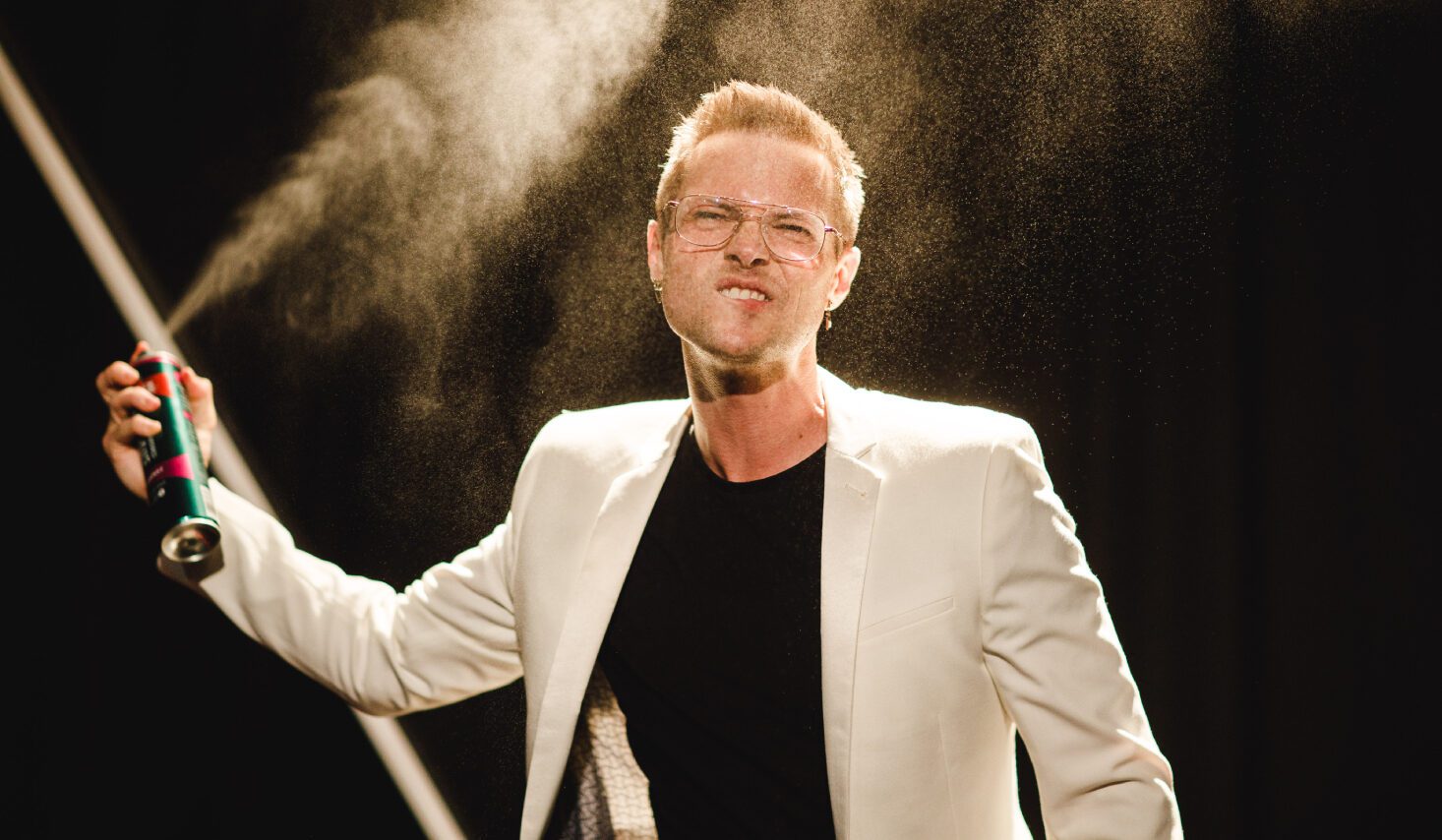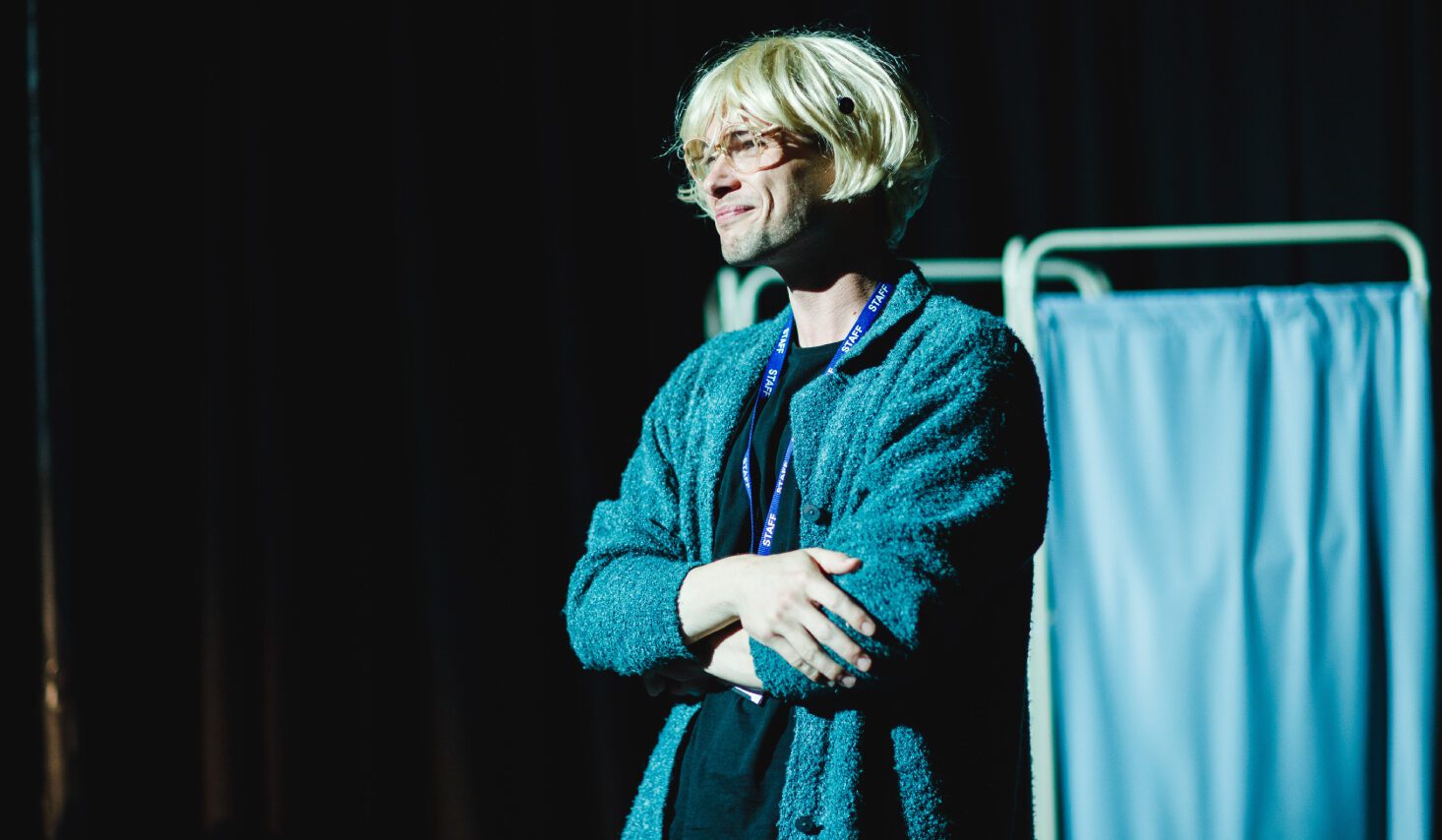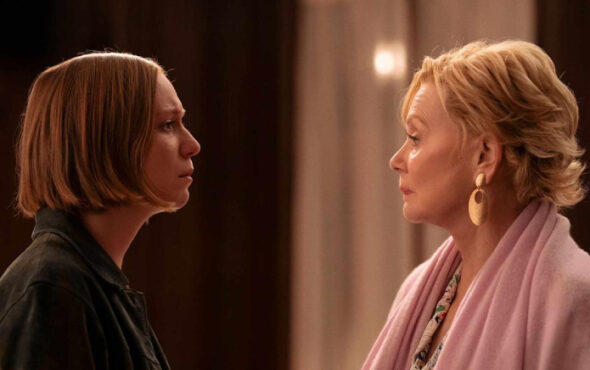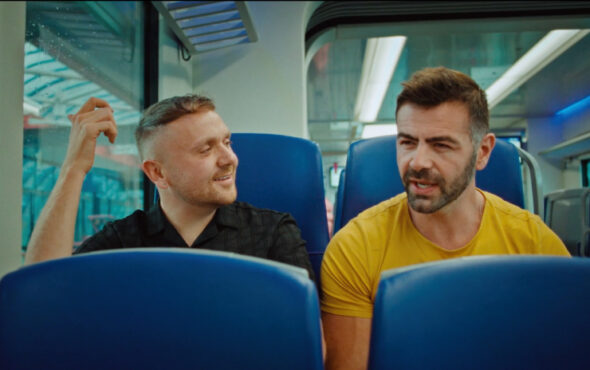
We’re excited for the return of First Time, the solo show from Nathaniel Hall, who we saw playing the role of Donald – Ritchie’s boyfriend – in hit TV series It’s A Sin earlier this year.
First Time has toured previously, including scooping a host of accolades at the 2019 Edinburgh Fringe and catching the attention of a certain Russell T Davies who described it as ‘a truly remarkable story of triumph’.
We can’t wait to see the play, and we caught up with writer, actor and HIV activist Nathaniel the week before rehearsals began to learn more.
What can audiences expect from First Time?
First Time was being written at the same time as It’s A Sin was, but my show is very much about HIV in the present day. It’s A Sin – it’s amazing that we’ve had this piece of history, particularly LGBTQ+ history, told on a mainstream channel because we haven’t had that in the UK yet. But that really is history, it’s one side of HIV, which is not a death sentence any more. People are living long, healthy and happy lives with HIV. I was diagnosed in 2003 so I was on the cusp, this turning point of HIV. Antiretroviral medication, effective medication, had been around since 1996, which had this Lazarus effect – people who were on their death beds were all of a sudden well enough to go back to work.
I was lucky, but also I was at that point when medications were still new, side effects were difficult to manage, I was given a life prognosis that was shorter. I was told I would have a life expectancy of about 37 years, so to hear that at 16 and to go, ok, your life is going to be considerably shorter because of this thing. The messaging at that time was quite heavy around diagnosis, I was taken to a separate room, I was told to think carefully about who I disclose to, given information about telling people at work, whether I should or not and the legality of that, it was all quite negative and heavy. That really had an impact on me but I didn’t realise until much later in life.
So it’s about the psychological impact of all that, what it feels like to live with HIV, what it feels like to be stigmatised, because I feel like it’s still a stigmatised illness, and the impact that’s had on me and my journey of living very secretively for 15 years and then deciding to break through that and go ‘something has to change here around the stigma of HIV’. Although it’s my story, it’s a gay man’s story, I work a lot with other people with HIV and this idea of shame, stigma, not telling people – it’s very common. I don’t see that story represented, and I want to see that story, so I went out and made it.
What are the key themes of the show?
One of the things people people say, whether you’re HIV+ or not, it really demonstrates what it’s like to have a mental health crisis, or to feel stigmatised, or to feel that you are losing your grip on reality. There are a couple of real moments where that’s demonstrated, and the theatre is such a powerful way to do that because if you’ve ever had a mental health crisis like I’ve had – it doesn’t necessarily feel like you see that on TV in full. In theatre you can explore it in a different way.
People say they’re surprised that the show is so funny. We have this policy where we make you laugh until you cry, and then we make you laugh again. That arc is what we make sure our shows follow, because there always has to be hope, and I think even in the darkest moments there’s humour. You find that within the show because we take you to a really dark place and then the tension’s broken. Often that’s not a set up joke, that’s just me telling something that’s happened. Life is funnier than art, honestly!
After I’d finally told my family after 15 years, my mum turned up on my doorstep the next day with a houseplant. I was like, ‘why have you brought a houseplant?’ And she was like ‘what do you bring when your son tells you that? I was walking around Tesco for half an hour trying to think – champagne doesn’t feel right!’ She didn’t need to get anything, really. So it is very funny, it’s not flippant humour, we’re not being flippant about the subject matter but it’s about helping and supporting an audience to have a good time.
What do you want the audience to take away having seen it?
I think it’s about getting tested, and I think there are lots of your readers who will know about PrEP – pre-exposure prophylaxis and also PEP which is the post-exposure prophylaxis – and also we know condoms are an effective way to stop HIV. But they’re not always on the table and that’s totally fine, no shame from me because I didn’t use a condom! But I think it’s about those messages – if you’re sexually active, you have a responsibility to protect yourself and others. To do that you need to get regularly tested, you can do that at home now, it’s so easy.
With those tools, and with U=U, which means people like me on effective medication can’t pass it on – with all that, we’re closing in on HIV from all angles. We have seen a dramatic drop in the men who have sex with men community, because there’s been a huge uptake of PrEP, and we’re closing in on all angles on this and hopefully we’re on target to end all new transmissions by 2030. As always, the LGBTQ+ community is leading the way on that and I think that’s really important. I understand and I have compassion for people in our community who are scared, who have fear around HIV, because despite all the positives I’m talking about it’s not something you want to go shopping for!
HIV is something that will dramatically change your life, it is going to make life more complicated, so I understand that fear. But I think being in control, taking that control, it’s quite sexy. It’s great! So come see the show, learn about what it feels like to live with HIV, understand and have compassion for people with HIV and become an ally. But also, ask yourself ‘what’s my responsibility in that target to end new transmissions by 2030?’

You’ve previously mentioned that your partner uses PrEP…
He came to see First Time very early in 2020 before the pandemic when it was on tour last, and he messaged me on social media. But we went into lockdown and we’d been following each other on Instagram, and we got chatting, and then got into a relationship. We got to that point where we were talking about it and obviously he knew I was HIV+ prior to this as he’d seen my show… I asked him what he wanted to do in terms of sex when it comes to that, and he said he was on PrEP. And I said, ‘well, you don’t really need to take it, you can stop now if we’re going into a monogamous relationship’. And he just said to me, ‘well, that puts all the responsibility on you, and I don’t want to do that’. And no-one’s ever said that to me. Ever!
Since I was 16 people have always, and I’ve always, felt like it was my responsibility: my responsibility to tell people about my HIV status, to protect somebody else, to say we need to use a condom, to say I’m using medication to stop the transmission. And then also to face rejection from that, from people with negative attitudes. For somebody else to go ‘it’s not just your responsibility, it’s mine as well, and it’s a level playing field’… it’s just incredible, that’s a very powerful thing. Other people, particularly if you are part of the LGBTQ+ community – we know that HIV disproportionately affects gay men, so if you are a gay man, if you’re having regular sex, just saying ‘I’m on PrEP, we’re looking out for each other’ rather than ‘it’s all your responsibility’… it’s an amazing way that you can support people with HIV.
How do you think things have changed since you were diagnosed at 16 – both in terms of medication and also in terms of society’s attitudes?
If you’d said to me aged 16 after that diagnosis that I’d be able to have sex without a condom in my 30s I’d be like – that’s not gonna happen! That U=U message has revolutionised the lives of people living with HIV. Psychologically it’s done something quite powerful I think for me – I never use this term publicly, but I always felt like I was infected, that I was infectious, like I was a danger. I had this thing inside me and it had a real impact on me, and on sex and relationships. I think that U=U has changed that quite dramatically, essentially I’m as good as cured.
So healthcare is fantastic but I think terms of attitudes… I think It’s A Sin has done amazing things, I think it’s told a story that is relatively recent history but has been sort of buried and forgotten. Because our community is very traumatised, people might not want to relive that and I get it, that’s totally fine. But telling that story, I think it’s really helped people who lived through it to go ‘that’s really validating’, to see your story and the outpouring of affection, that people care like they did about It’s A Sin, that’s amazing.
For the younger generation I think they were shocked that this happened within living memory and that people were treated with such fear and disdain and hatred when they were sick. I don’t know whether a new pandemic has helped with that empathy, but I do still think there is a way to go, because there is still a lot of stigma and shame. The fact that I get people messaging me almost daily saying ‘what you’re doing is great but I could never be open about my HIV status’, that tells me there’s still work to do. If you got cancer, everyone would be empathetic, they’d be sympathetic, they’d tell you how brave you are and be with you while you’re on that journey. Why is it different for HIV? I know that there’s still work to be done.
We were thrilled to see so many queer creatives involved in It’s A Sin – is that important to you?
Absolutely and I don’t really understand when other gay people argue to the contrary, I find it bizarre! You’re arguing yourself out of work, it doesn’t make any sense. For me, being gay is not who I sleep with – that’s part of it – but I just feel fundamentally different to heterosexual people. You’re always going to get a more realistic performance from someone who’s lived it, who knows it. And that’s not to say I don’t think a straight person can play a gay person, there are amazing actors who can do that with sensitivity, but you know… straight people have been running the show for so long, why are we still giving them a free pass! Surely we really need to be demanding more!
One of the great things about working on It’s A Sin, it was a gay writer, a gay producer, a gay director, all of the gay characters were played by gay people, and we had a LGBTQ+ inclusive cast. People don’t really realise it but TV and film sets are quite macho environments, so as a gay man that can feel quite intimidating. To go into that environment and be like ‘oh we’re all like this’, that was amazing, it was a real eye-opener for me because I’d never had that, and it was great. So I am all for gay people for gay roles, trans people for trans roles, lesbian women for lesbian roles, absolutely.
How’s 2021 been for you and what have your highlights been?
It’s A Sin came out in February, in lockdown, it was amazing but really isolating because we didn’t go to a screening with everyone and see each other. I was living this kind of dual life, speaking to Lorraine, going on Steph’s Packed Lunch, going to all these different interviews and doing all these amazing things, but in this really controlled way, not being able to socialise with anyone afterwards and being sent straight back home. Steph’s Packed Lunch met me in a local park, everyone was saying how much they hated interviewing people in parks but it was the only place they could safely meet.
Lorraine was a Zoom call – I live with my parents, it was in the bedroom that I grew up, so it was a very surreal moment speaking to Lorraine from there! There was all that going on, but all this kinda twiddling your thumbs afterwards, just when you’d got the adrenaline pumping. It’s A Sin – I think the timing was perfect as people were gasping for new drama. It’s been a great year and I’m really excited to be back on tour with First Time and to be back doing what I love – even though a solo show is a real slog, I’m excited!
The First Time tour begins in Guildford on 7 October and will continue through November and December – a full list of cities, venues and ticket information can be found here.


